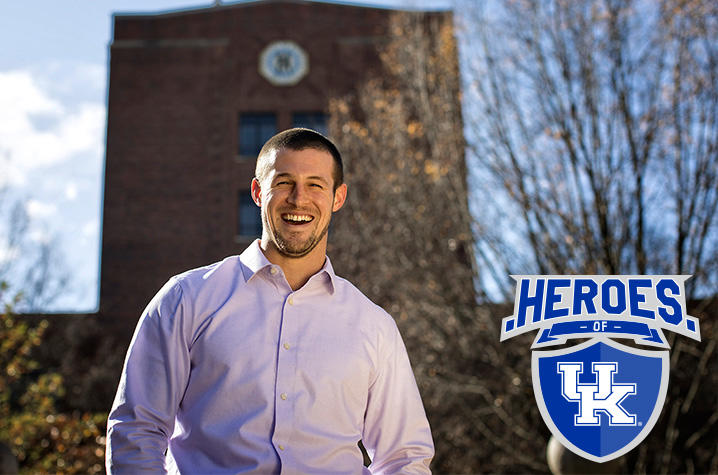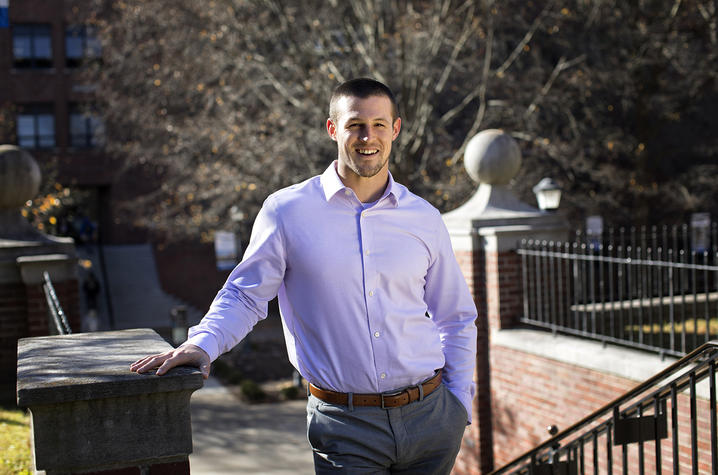UK Grad Student Shares Recovery Journey
LEXINGTON, Ky. (April 23, 2018) — Alex Elswick is earning his doctorate at the University of Kentucky. He's also the founder of a nonprofit organization and a leader in the fight against the opioid epidemic. And, Elswick is in long-term recovery from an opioid use disorder.
Like it does for so many, Elswick's opioid use disorder began with a prescription. After having his wisdom teeth removed, he was prescribed five days of pain medication. Unfortunately, complications with recovery from the surgery led to second five-day prescription for opioids. After those 10 days, when the prescription ran out, Elswick began to feel "bad," a feeling he says he can't fully describe and a person would only understand if they've experienced it. A combination of withdrawal symptoms, lethargy, anxiety and the belief that taking more opioids would take those feelings away led Elswick into active addiction that lasted from age 18 to 22.
In those four years, Elswick and his family worked to help him achieve sobriety. After sharing with his parents that he had a problem, he moved back home and commuted to college. But, changing his environment didn't change his physical dependence on opioids. Opioid use disorder is a chronic brain disease, that doesn't necessarily go away when pills become scarce. The family tried rehabilitation facilities with stays ranging from seven to 30 days. Unfortunately, their efforts were unsuccessful at that stage of his addiction.
Eventually, Elswick found himself homeless and living in Ohio. By this time his addiction to prescription opioids had graduated to heroin. A phone call to his parents ultimately set him on his path to recovery. When Elswick called from a payphone in Dayton to ask his parents for help, his father told him they could do nothing more and encouraged him to seek treatment. Shortly after, he checked in to a Salvation Army in Dayton, Ohio, a long-term adult rehabilitation center.
"In early recovery, you're so miserable; I wanted to leave every day for the first 30 days there. I think a lot of the reason I didn't was because I had nowhere to go," Elswick said while reflecting on his time at the Salvation Army.
His vivid memories of early recovery means Elswick knows that's when people with substance use disorders are in need of the most support. That's why Elswick, his mother and other allies founded Voices of Hope. What began as a grassroots movement to raise awareness and reduce the stigma associated with a substance use disorder diagnosis, has become a nonprofit organization helping to connect those with opioid use disorder, and their families, to recovery capital. Recovery capital is a term for the resources a person has access to that can aid them in entering and maintaining recovery.
Contributing to the body of knowledge surrounding long term recovery is one of the reasons Elswick chose to pursue his Ph.D. in family sciences from the UK College of Agriculture, Food and Environment, and why he conducts research to examine barriers to long term recovery. He's especially interested in the role of the family and how those relationships change through active addiction and recovery.
Having positive interactions with someone in recovery creates opportunities to reduce stigma and that's why Elswick is so vocal about his experiences. "Stigma leads to silence and silence is what's killing people," he said. Stigma prevents people with substance use disorder from seeking treatment, families from seeking support and people in recovery from accessing needs such as housing, jobs, and medical care. During Everything is Science, a citywide science festival taking place April 26 to 28, Elswick will provide community members an opportunity to meet him and hear his story.
Elswick has had opportunities to vocalize the needs of those with opioid use disorder to key players in the fight against the opioid epidemic including former U.S. Attorney General Loretta Lynch, Secretary of the U.S. Department of Health and Human Services Eric Hargan and leaders during the White House Opioid Summit in March. Those experiences made Elswick feel "like they're really trying to listen." He said it's important for government officials to hear directly from those with substance use disorders because, "there's a lived experience with addiction, you can't understand if you haven't been there."
Elswick has a saying, "Sobriety is about what you don't do, like drugs and alcohol, recovery is about what you do instead." Improving access to services and resources that enable people to do the things they need to maintain recovery is the goal of Elswick's research, his nonprofit and his advocacy on behalf of those with opioid use disorder.
The next time you pack a theater to watch your favorite superhero blockbuster, remember that not all heroes wear red-and-gold armor, wield a hammer or carry a shield. Some heroes wear blue and white, wield a UK degree and carry a love for the Commonwealth in their heart. Meet more of UK's heroes by following along on all our social channels with #heroesofUK.






